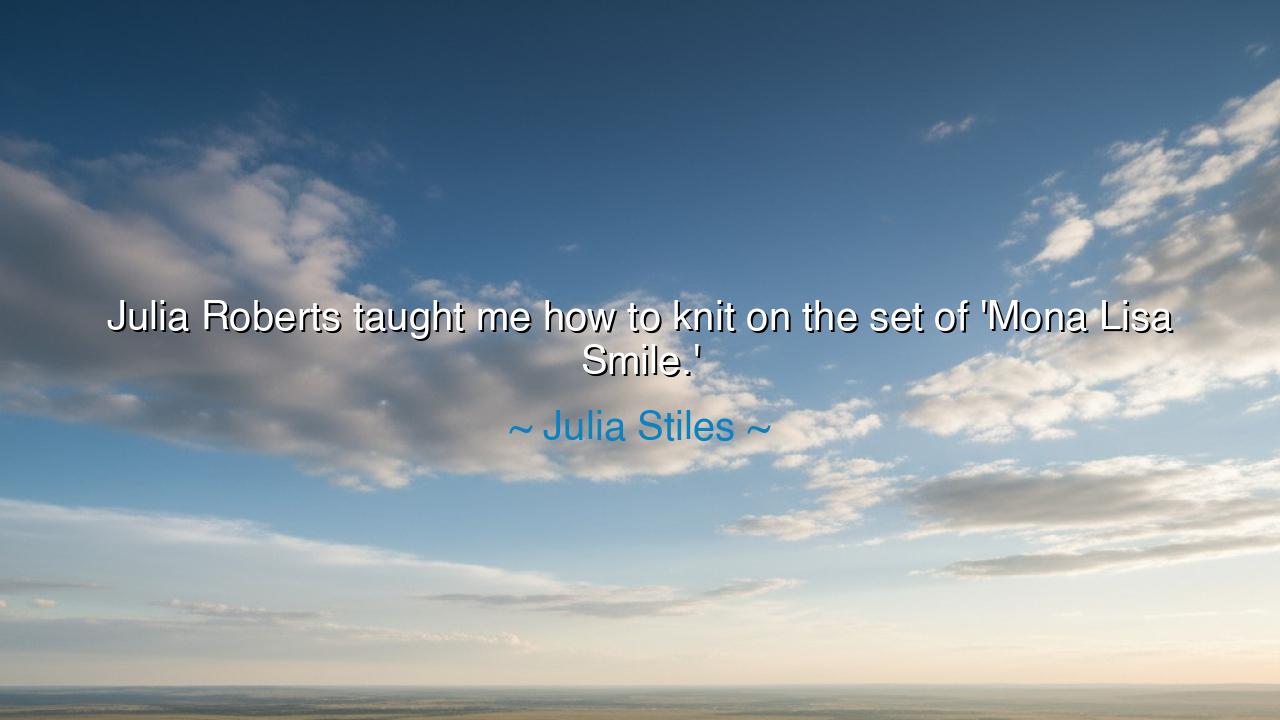
Julia Roberts taught me how to knit on the set of 'Mona Lisa






Hear now the tender words of Julia Stiles, spoken with the simplicity of memory, yet carrying within them a teaching that echoes beyond the screen: “Julia Roberts taught me how to knit on the set of ‘Mona Lisa Smile.’” At first, these words seem light, a mere anecdote from the making of a film. Yet in truth, they reveal something far greater—the beauty of shared craft, the passing of wisdom from one hand to another, the quiet intimacy of learning something simple that binds souls together across time.
The meaning of this truth begins with knitting itself. To knit is not only to weave threads of wool, but to weave patience, care, and attention into fabric. It is an act as old as civilization, born of necessity yet sustained by love. For when one knits, one creates warmth for another—clothing for a child, a blanket for a home, a scarf for a friend. That Julia Roberts taught this to Julia Stiles upon a film set reminds us that wisdom can be passed in the quiet moments between great labors, that the most enduring lessons are not always written in books or proclaimed on stages, but whispered in the ordinary hours of life.
Consider also the setting: Mona Lisa Smile, a film about women, education, and the courage to shape their destinies in a changing world. To learn knitting in such a place carries symbolic weight—it is both a nod to tradition and an act of continuity, connecting women of the past, who learned such crafts as part of their daily existence, with women of the present, who choose freely how they shape their lives. What might have once been considered duty is transformed into art, into leisure, into memory.
History too bears witness to the power of shared craft. In ancient Sparta, warriors sharpened their skills not only on the field but by watching and imitating one another, learning hand to hand. In monasteries of the Middle Ages, young novices learned to illuminate manuscripts by sitting beside older monks, watching the slow work of brush and ink. And in countless homes across centuries, mothers, fathers, and elders have taught simple skills—cooking, weaving, carving—not only to sustain life but to pass on memory, tradition, and affection. In every case, the act of teaching and learning became a bond stronger than the craft itself.
There is also a lesson in humility here. Julia Roberts, a star of great renown, did not choose to teach her colleague acting tricks or lines of glory, but instead something as humble as knitting. It reveals the truth that greatness is not in lofty gestures but in the simple acts of generosity we extend to others. Roberts gave Stiles a skill, but more importantly, she gave her time, her presence, and a memory that could never be undone. This is what true teaching is: the offering of self, not just the offering of knowledge.
The smile in the title of the film resonates here as well. The Mona Lisa’s smile is mysterious, eternal, impossible to fully grasp. And yet, in this story, the smile becomes real—not an enigma, but a moment of genuine human connection. Two women, bound by art and craft, finding joy in something small. What began as film became life; what was meant to be performance became memory.
The lesson for us is clear: do not overlook the small moments of teaching and learning. You may never know how lasting their impact will be. A skill shared, no matter how humble, becomes part of the legacy of your life, carried forward by the one you taught. Likewise, do not wait for formal teachers to guide you. Be open to learning from anyone, at any time, for the simplest lessons often endure the longest.
Thus, the teaching is eternal: Greatness is not always in the grand gesture, but in the quiet passing of wisdom, in the knitting together of souls through small acts of care. Remember the example of Julia Roberts and Julia Stiles: that a lesson offered with love, even amidst the bustle of great labors, may remain a treasure for all the days to come.






AAdministratorAdministrator
Welcome, honored guests. Please leave a comment, we will respond soon